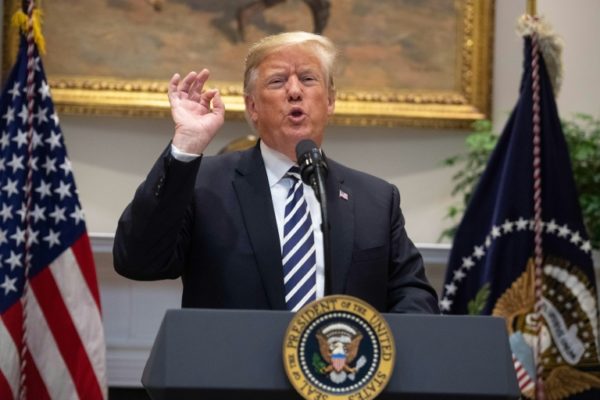Special Counsel Robert Mueller may not have found evidence of a criminal conspiracy between Donald Trump’s 2016 campaign and Russia, but his report details extensive contacts between the campaign and Russian operatives who sought to influence the election.
Mueller said in his report released on Thursday that he found “numerous links” and that the Trump campaign “expected it would benefit” from Russia’s effort to tilt the ballot in Trump’s favour.
Ultimately, Mueller determined the various contacts either didn’t amount to criminal behaviour or would be difficult to prove in court, even if people in Trump’s orbit sometimes displayed a willingness to accept Russian help, the report showed.
Trump and his allies, who derided the Mueller probe as a political “witch hunt”, portrayed the report as vindication. “No collusion. No obstruction. For all the haters and the radical left Democrats, game over,” Trump tweeted on Thursday.
“The bottom line is the president is exonerated and the campaign is exonerated of collusion,” said Michael Caputo, a former adviser to Trump’s campaign.
Some legal experts and political strategists were more circumspect, saying the report confirmed the Russian government was attempting to help Trump with the election.
“I think that’s a pretty extraordinary finding of historical significance, whether or not there’s a crime,” said Matthew Jacobs, a former federal prosecutor who is now a San Francisco-based lawyer.
Many of the contacts in the report were already known. They included former national security adviser Michael Flynn’s conversations in late 2016 with Sergei Kislyak, Russia ambassador at the time, and former Trump campaign chairman Paul Manafort’s interactions with Konstantin Kilimnik, a political consultant who the FBI has determined has ties to Russian intelligence.
But the report contained fresh details on the range of official and unofficial dealings Trump campaign advisers and supporters had with Russians before and after the 2016 election.
For example, the report says that Manafort, shortly after he joined the campaign in the spring of 2016, directed his deputy to share internal polling data with Kilimnik with the understanding it would be passed on to Oleg Deripaska, a Russian oligarch known to have close ties to the Kremlin.
Lawyers for Manafort did not immediately respond to a request for comment. Kilimnik did not reply to an email seeking comment.
A Washington-based attorney for Deripsaka said he could not comment. In a statement to Reuters in January, representatives for Deripaska said he has never had any communication with Kilimnik.
The report also says that Manafort told Kilimnik in August 2017 about the campaign’s efforts to win the battleground states of Michigan, Pennsylvania, Wisconsin and Minnesota. Trump ended up winning three of those states in the November election.
Mueller’s investigation did not find a connection between Manafort’s sharing of polling data and Russia’s meddling in the U.S. election or that he otherwise coordinated with Russia.
Frank Montoya, a former senior FBI official, said he was nonetheless bothered by the interactions between Manafort and Kilimnik, especially their talking about battleground states.
“As a longtime counterintelligence investigator it makes the hair stand on the back of my neck,” Montoya said.
The report detailed a meeting in December 2016 between Trump’s son-in-law Jared Kushner and Sergei Gorkov, the head of a Russian state-owned bank under U.S. sanctions. Gorkov gave Kushner a painting and a bag of soil from the town in Belarus where Kushner’s family is from, the report says.
Mueller’s team said it could not resolve a conflict in the accounts of Kushner, who said the meeting was diplomatic in nature, and Gorkov, who said it was business related.
Kushner has said neither sanctions nor his business activities were discussed at the meeting. Kushner’s lawyer did not respond to a request for comment on Mueller’s report.
The report also provided new details about a meeting that campaign advisers Donald Trump Jr., the president’s oldest son, Kushner and Manafort held with a Russian lawyer at New York’s Trump Tower in June 2016. The meeting was set up after the advisers were promised “dirt” on Hillary Clinton, Trump’s Democratic challenger for president.
Mueller’s team considered whether the advisers violated laws barring election contributions from foreigners. But, the report says, they ultimately decided there was not enough evidence to show they “wilfully” broke the law and they might have had problems proving the information offered on Clinton was really valuable.
When news of the Trump Tower meeting broke in July 2017, Trump Jr. issued a statement saying the meeting was set up to discuss adoption policy, not politics, before later admitting he had been expecting intelligence on Clinton.
Such interactions have broadly been referred to by Democratic congressional investigators as examples of possible “collusion”. But because collusion is not a legal term, Mueller’s team examined the Trump Tower meeting and other contacts through the lens of federal conspiracy law.
Mueller said his investigation was unable to establish that such contacts with Russians met the bar of criminality which required that the contacts “amounted to an agreement to commit any substantive violation” of U.S. laws, including those governing campaign finance and foreign agent registration.
Therefore, Mueller said his office “did not charge any individual associated with the Trump Campaign with conspiracy to commit a federal offense arising from Russia contacts.”














